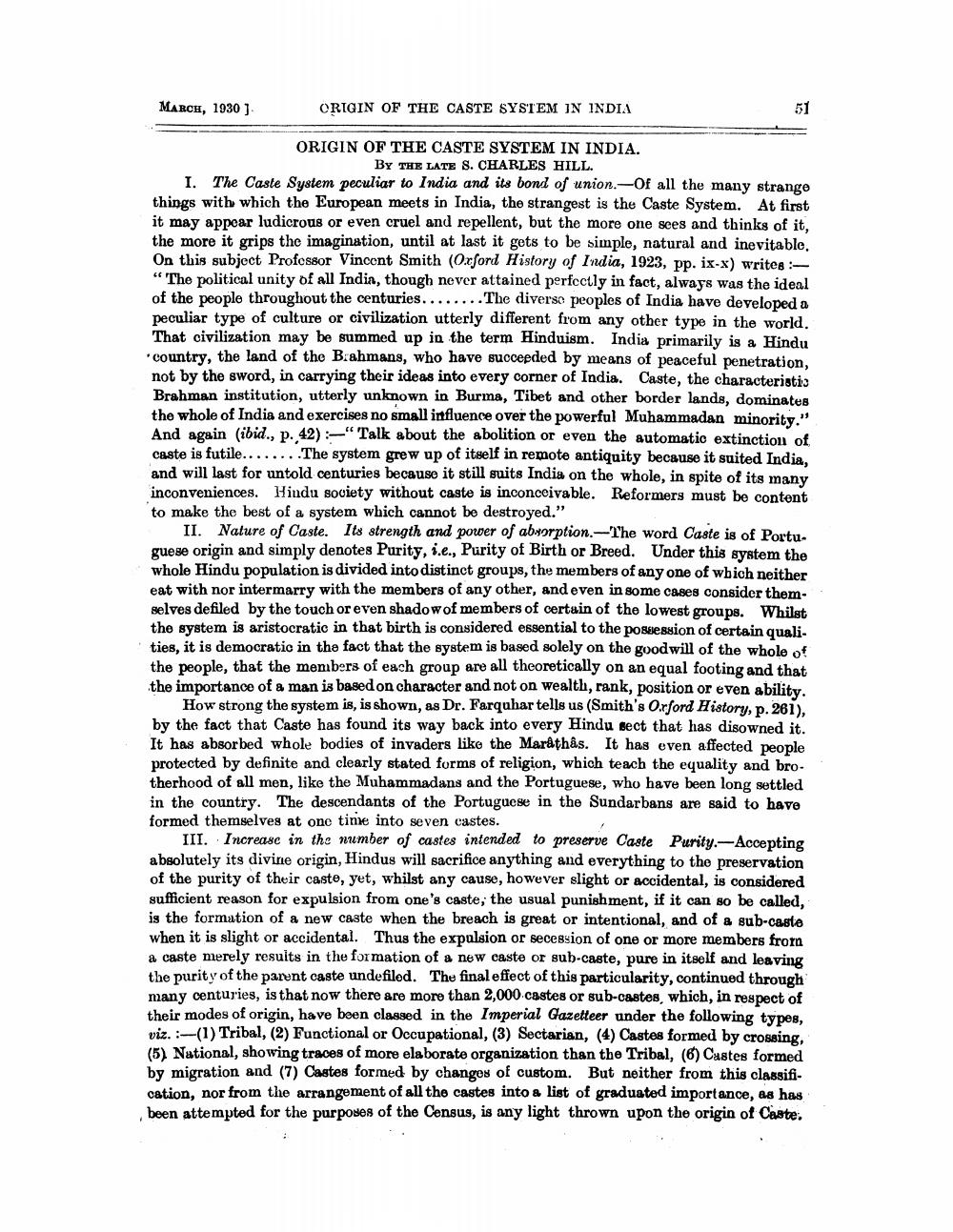________________
MARCH, 1930)
ORIGIN OF THE CASTE SYSTEM IN INDIA
ORIGIN OF THE CASTE SYSTEM IN INDIA.
BY THE LATE S. CHARLES HILL. I. The Caste System peculiar to India and its bond of union.-Of all the many strange things with which the European meets in India, the strangest is the Caste System. At first it may appear ludicrous or even cruel and repellent, but the more one sees and thinks of it, the more it grips the imagination, until at last it gets to be simple, natural and inevitable. On this subject Professor Vincent Smith (Oxford History of India, 1923, pp. ix-x) writes :"The political unity of all Indin, though never attained perfectly in fact, always was the ideal of the people throughout the centuries........The diverse peoples of India have developed a peculiar type of culture or civilization utterly different from any other type in the world. That civilization may be summed up in the term Hinduism. India primarily is a Hindu country, the land of the Brahmans, who have succeeded by means of peaceful penetration, not by the sword, in carrying their ideas into every corner of India. Caste, the characteristis Brahman institution, utterly unknown in Burma, Tibet and other border lands, dominates the whole of India and exercises no small influence over the powerful Muhammadan minority." And again (ibid., p. 42) "Talk about the abolition or even the automatic extinction of caste is futile........The system grew up of itself in remote antiquity because it suited India, and will last for untold centuries because it still suits India on the whole, in spite of its many inconveniences. Hindu society without caste is inconceivable. Reformers must be content to make the best of a system which cannot be destroyed.”
1. Nature of Caste. Its strength and power of absorption.-The word Caste is of Portu. guese origin and simply denotes Purity, i.e., Purity of Birth or Breed. Under this system the whole Hindu population is divided into distinct groups, the members of any one of which neither eat with nor intermarry with the members of any other, and even in some cases consider themselves defiled by the touch or even shadow of members of certain of the lowest groups. Whilst the system is aristocratic in that birth is considered essential to the possession of certain qualities, it is democratic in the fact that the system is based solely on the goodwill of the whole of the people, that the members of each group are all theoretically on an equal footing and that the importance of a man is based on character and not on wealth, rank, position or even ability.
How strong the system is, is shown, as Dr. Farquhar tells us (Smith's O.rford History, p. 261). by the fact that Caste has found its way back into every Hindu sect that has disowned it. It has absorbed whole bodies of invaders like the Marathås. It has even affected people protected by definite and clearly stated forms of religion, which teach the equality and bro. therhood of all men, like the Muhammadans and the Portuguese, who have been long settled in the country. The descendants of the Portuguese in the Sundarbans are said to have formed themselves at one time into seven castes.
III. Increase in the number of castes intended to preserve Caste Purity.--Accepting absolutely its divine origin, Hindus will sacrifice anything and everything to the preservation of the purity of their caste, yet, whilst any cause, however slight or accidental, is considered sufficient reason for expulsion from one's caste, the usual punishment, if it can so be called, is the formation of a new caste when the breach is great or intentional, and of a sub-caste when it is slight or accidental. Thus the expulsion or secession of one or more members frorn a caste merely results in the formation of a new caste or sub-caste, pure in itself and leaving the purity of the parent caste undefilod. The final effect of this particularity, continued through many centuries, is that now there are more than 2,000 castes or sub-castes, which, in respect of their modes of origin, have been classed in the Imperial Gazetteer under the following types, viz. :-(1) Tribal, (2) Functional or Occupational, (3) Sectarian, (4) Castes formed by crossing, (5) National, showing traces of more elaborate organization than the Tribal, (6) Castes formed by migration and (7) Castes formed by changes of custom. But neither from this classification, nor from the arrangement of all the castes into a list of graduated importance, as has been attempted for the purposes of the Census, is any light thrown upon the origin of Caste.
stes.




